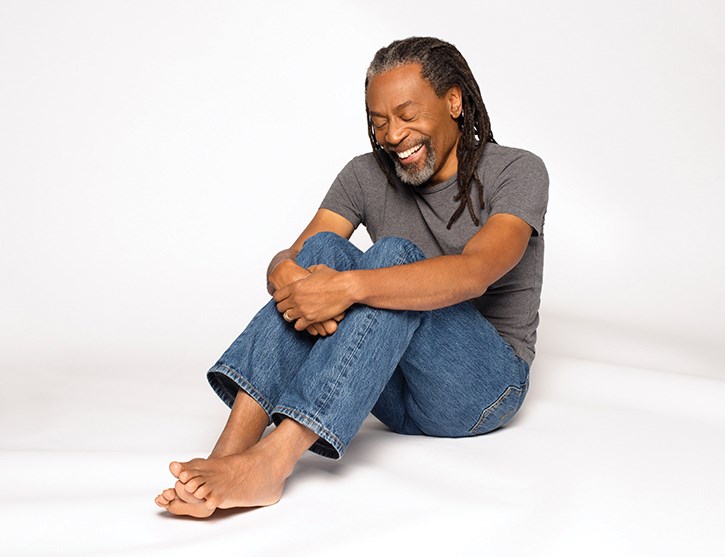Jazz vocalist Bobby McFerrin may be best known for his 1988 a cappella hit Don’t Worry, Be Happy, but the 10-time Grammy Award winner is anything but a one-hit wonder. McFerrin’s career has spanned more than 30 years and has featured collaborations with such heavyweights as Chick Corea, Herbie Hancock, and Yo-Yo Ma. When he’s not on stage delivering his unique, polyphonic vocal stylings, he regularly tours as a guest conductor for symphony orchestras across North America. McFerrin is currently in the middle of a Canadian tour in support of his latest album, spirityouall, and will be playing the Orpheum Theatre this Sunday as part of the Vancouver International Jazz Festival.
You have a very unique vocal technique: There’s a lot of percussive tapping, you frequently slip in and out of falsetto, you scat, even beatbox. How did you develop your unique approach and what was it influenced by?
I had a really unusual experience. I can tell you my story, but I want to make sure young people don’t think they have to mimic my path. My story proves that everybody has their own way forward, however unlikely. I grew up in a family of singers, in a house filled with all kinds of music. We always sang together, and I sang in the church choir as a child, lots of Bach.
But I wanted to be different, and I thought I was the instrumentalist in the family. First I was very serious about the clarinet, then the piano. I started my professional career as a musician as a pianist and bandleader when I was only 14. I had the kinds of experiences a lot of young musicians have – I played in clubs and for parties, I studied composition for a while, I worried about money, I led the touring band for the Ice Follies, I played for dance classes, I listened to Miles [Davis] and Herbie [Hancock] and felt transformed.
One day I was walking home from playing for a dance class in Salt Lake City, when I was 27 years old, and suddenly I realized that what I was hearing in my head was the music I wanted to make, and that I’d been a singer all along. It was pretty fully formed.
It took me years of practicing to be able to do it, but I could hear what I wanted to do.
Looking back, I can tell you I was influenced by my dad’s singing, or the sound and range of the piano, or watching Keith Jarrett take an audience by the hand and lead them into his imagination. But in that moment I simply had a revelation.
And of course then the hard work began.
One of the tenets of jazz is improvisation. Tell me about the importance of improvisation in your work.
I think all of life is improvisation. And all improvisation is about moving forward through time. You just keep moving forward.
You were touring South America last month, your Jazz Fest gig is in the middle of a Canadian tour, and you’re off to Europe in July. Life on the road can take a toll on your health, on your relationships. How do you keep it together?
I try to stay right with myself, right with the people I love, right with God. I need a lot of quiet time to do what I do. I wake up, I take a walk, I read the Book of Psalms, I sing, I have lunch with my sound engineer, I go to soundcheck. I keep my life simple and quiet. I eat healthy food and drink lots of water and tea. I stay in touch with my family. I don’t perform; I go on stage and I’m the same guy who just made up a stupid song backstage to celebrate the locating of the ginger tea bags. And I have a pretty strong sense of what I’m here to do.
I think my job as an artist is to bring joy. I stay focused on that.
Recently you appeared in a documentary based on Daniel Levitin’s book This is Your Brain on Music, which explores the universal human connection with sound and music. What is it about music that makes it so essential for human happiness, whether to perform it or to listen to it?
It’s a great mystery, isn’t it? Endlessly fascinating. I love to watch and hear audiences respond. No matter where I am there are some things that are always the same. Hardwired.
You are most well-known for your hit, Don’t Worry, Be Happy. How has that song changed your life?
It gave me some incredible opportunities. To reach a larger audience, to tour with Voicestra and other not-so-mainstream projects and bring them to people who wouldn’t usually listen to purely improvised music. And it also made me think hard about who I really was and what I really wanted. I’m grateful the song means so much to people.
Following the release of Don’t Worry, Be Happy, a strange rumour persisted that you had committed suicide. Radio deejays made mention of the irony that the artist responsible for Don’t Worry, Be Happy had taken their own life. What was your reaction when you first heard that you had died?
There are a lot of things I don’t really pay attention to. I had pretty good evidence that I was still alive! My manager thinks it’s because of the video for the song, there’s a scene where I jump off a cliff. It’s a metaphor, people!
What was the last album you listened to?
My son Taylor’s new album!
• Bobby McFerrin performs at the Orpheum Theatre on Sunday, June 22, as part of the TD Vancouver International Jazz Festival. NorthernTickets.com


